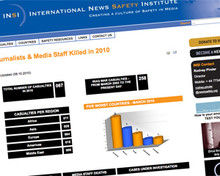
The group wants the safety modules to become a mandatory part of journalism schools' curricula worldwide, raising students' awareness of safety issues and how to protect themselves at work.
"Safety isn't included in any journalism courses that we're aware of as part of the curriculum. We think it's vitally important that journalists leave journalism school or university or wherever with all the tools that they need to do their job and tell the story properly," Rodney Pinder, director of the INSI, told Journalism.co.uk.
The modules will form a basic introduction to safety issues, equipping students with "at least a rudimentary understanding" before they embark on their careers, said Pinder. The INSI will continue to raise funds for free training for journalists working in conflict zones and in developing nations, he said.
The INSI's partners include the Cardiff Centre for Journalism, City University London, the Gaylord School of Journalism and Mass Communication in Oklahoma and the University of Western Ontario's School of Journalism. More universities will join the initiative, which is also being assisted by the Canadian Journalism Forum on violence.
"Safety is such an important part of modern journalists' training," Professor Richard Tait, director of the Centre for Journalism at Cardiff University, told Journalism.co.uk. Tait has always included teaching about safety and issues such as post-traumatic stress in Cardiff's courses, but says this is not an industry standard.
"There weren't many schools who did it and even now it's not compulsory. I make it a mandatory part of the course and the students are examined on it and it's incorporated into the newsroom practice modules.
"Why don't we make it compulsory for everybody? Journalists have to know the law, they have to know ethics - there are a number of professional standards without which you can't really call yourself a journalists. Why shouldn't safety be part of that?"
The safety modules will offer advice tailored to specific countries of teaching and will not just focus on advice for journalists in conflict areas, but also more how to work safely in what may be considered less threatening environments, such as crowd situations or after football matches.
The group working on the programme hopes to showcase its initial plans and have experimented with some modules by the summer of 2011.
Cardiff University is also working with the INSI to launch a searchable database of journalists' deaths across the globe as part of an online safety resource.
Free daily newsletter
If you like our news and feature articles, you can sign up to receive our free daily (Mon-Fri) email newsletter (mobile friendly).
Related articles
- Meet the inspiring, disabled journalists working their dream jobs
- Shaping the future of journalism: insights for the next generation
- New free course on war reporting launched
- Solutions journalism superstars: media mentor and trainer, Swati Sanyal Tarafdar
- Preethi Nallu, global director, Report for the World, on strengthening media ecosystems









